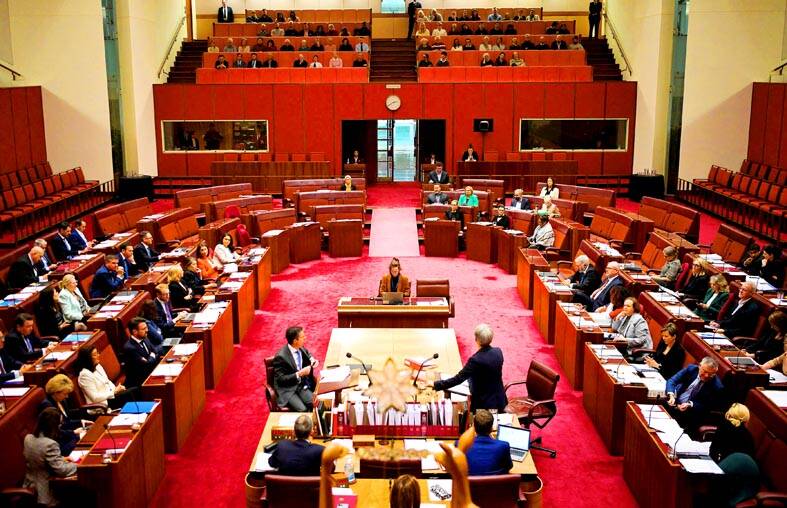The Australian Senate on Wednesday unanimously passed an “urgency motion” in support of Taiwan’s sovereignty and participation in international organizations.
Senators agreed by vote to move the motion “that United Nations Resolution 2758 of 25th October 1971 does not establish the People’s Republic of China’s [PRC] sovereignty over Taiwan and does not determine the future status of Taiwan in the United Nations, nor Taiwanese participation in UN agencies or international organizations.”
The motion was cosponsored by Australian senators David Fawcett and Deborah O’Neill, both of whom visited Taiwan last month to attend the Inter-Parliamentary Alliance on China’s (IPAC) annual conference.

Photo: Reuters
Addressing Parliament House in Canberra, Fawcett said that the motion was “urgent” because of the “growing risk to the security and stability in the Indo-Pacific” region.
“It’s important not just for the human rights of the 23.5 million people in the democracy that is Taiwan, but for the impact that a decrease in security and a conflict there would have on the rules-based order that underpins peace and security around the world, as well as for the global economic impact, which Australia would not escape,” Fawcett said.
O’Neill followed Fawcett’s remarks by saying that “the resolution does not mention Taiwan or address its political status.”
“Despite this fact, there is an ongoing and egregious campaign currently underway from the PRC to reinterpret the resolution and misrepresent what the resolution actually does,” she said, referring to China’s attempts to minimize Taiwan’s participation in the international community.
O’Neill said it was “not in the interest of the international community to have 24 million Taiwanese excluded” from critical bodies such as the International Civil Aviation Organization and the WHO.
Australian Senator Jacqui Lambie said that “the people of Taiwan continuously reject reunification [sic] with the Chinese Communist Party, with less than 5 percent of support for the reunification in Taiwan.”
“The Chinese Communist Party has no business in destroying democracy in Taiwan,” Lambie said. “Australia must stand up against the Chinese Communist Party and back the more than 22 million people of Taiwan who choose democracy and freedom over the authoritarianism of the Chinese Communist Party.”
Australian Senator Raff Ciccone said that Australia’s economic, trade and cultural interests with Taiwan “cannot be understated.”
Pledging to continue energy cooperation and support Taiwan’s transition to renewable energies, Ciccone told the house that Australia was Taiwan’s largest energy supplier, contributing “around two-thirds of Taiwan’s coal and almost half of its natural gas.”
In Taipei, the Ministry of Foreign Affairs (MOFA) yesterday welcomed the motion, describing it as “just.”
“MOFA strongly affirms the Australian parliament’s firm support for Taiwan’s international participation and thanks Australia and IPAC for speaking out for Taiwan,” it said. “We also call on the international community to jointly counter China’s misinterpretation of UN General Assembly Resolution 2758 and China’s attempts to make false connections between the resolution and the so-called ‘one China’ principle.”

CHAOS: Iranians took to the streets playing celebratory music after reports of Khamenei’s death on Saturday, while mourners also gathered in Tehran yesterday Iranian Supreme Leader Ayatollah Ali Khamenei was killed in a major attack on Iran launched by Israel and the US, throwing the future of the Islamic republic into doubt and raising the risk of regional instability. Iranian state television and the state-run IRNA news agency announced the 86-year-old’s death early yesterday. US President Donald Trump said it gave Iranians their “greatest chance” to “take back” their country. The announcements came after a joint US and Israeli aerial bombardment that targeted Iranian military and governmental sites. Trump said the “heavy and pinpoint bombing” would continue through the week or as long

TRUST: The KMT said it respected the US’ timing and considerations, and hoped it would continue to honor its commitments to helping Taiwan bolster its defenses and deterrence US President Donald Trump is delaying a multibillion-dollar arms sale to Taiwan to ensure his visit to Beijing is successful, a New York Times report said. The weapons sales package has stalled in the US Department of State, the report said, citing US officials it did not identify. The White House has told agencies not to push forward ahead of Trump’s meeting with Chinese President Xi Jinping (習近平), it said. The two last month held a phone call to discuss trade and geopolitical flashpoints ahead of the summit. Xi raised the Taiwan issue and urged the US to handle arms sales to

BIG SPENDERS: Foreign investors bought the most Taiwan equities since 2005, signaling confidence that an AI boom would continue to benefit chipmakers Taiwan Semiconductor Manufacturing Co’s (TSMC, 台積電) market capitalization swelled to US$2 trillion for the first time following a 4.25 percent rally in its American depositary receipts (ADR) overnight, putting the world’s biggest contract chipmaker sixth on the list of the world’s biggest companies by market capitalization, just behind Amazon.com Inc. The site CompaniesMarketcap.com ranked TSMC ahead of Saudi Aramco and Meta Platforms Inc. The Taiwanese company’s ADRs on Tuesday surged to US$385.75 on the New York Stock Exchange, as strong demand for artificial intelligence (AI) applications led to chip supply constraints and boost revenue growth to record-breaking levels. Each TSMC ADR represents

Pro-democracy media tycoon Jimmy Lai’s (黎智英) fraud conviction and prison sentence were yesterday overturned by a Hong Kong court, in a surprise legal decision that comes soon after Lai was jailed for 20 years on a separate national security charge. Judges Jeremy Poon (潘兆初), Anthea Pang (彭寶琴) and Derek Pang (彭偉昌) said in the judgement that they allowed the appeal from Lai, and another defendant in the case, to proceed, as a lower court judge had “erred.” “The Court of Appeal gave them leave to appeal against their conviction, allowed their appeals, quashed the convictions and set aside the sentences,” the judges